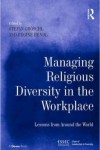
How do managers in Not-For-Profit organizations conceptualize their career success? While the for-profit sector provides more objective measures such as salary level or position in the hierarchy, Not For Profit Organizations often lack hard and fast metrics. This work seeks to develop a theoretical model of how career success might be conceptualized. Based on social cognitive theory, the Cognitive Career Success Model (CCSM) attempts to explain the process of conceptualization through four loops: goal setting, attribution, equity evaluation and social comparison. While the CCSM is applicable to careers in all sectors and fields, this work looks in particular at specificities of the Not For Profit field. It examines different motivational make-up of managers in such organizations, particular personality traits, and special aspects of this career field.

Religious Diversity in the Workplace presents essays, conceptual papers, empirical studies and case studies about how religious diversity and spirituality are managed in the workplace. The different contributions discuss policies and practices of firms addressing the religious and spiritual beliefs of their employees, how implicit and unmarked religious norms influence the ‘managing’ of religious issues in organizations, and what the benefits of a religion diverse workforce are. The perspectives and contributions include a wide range of disciplines by authors from leading academic institutions around the world.




